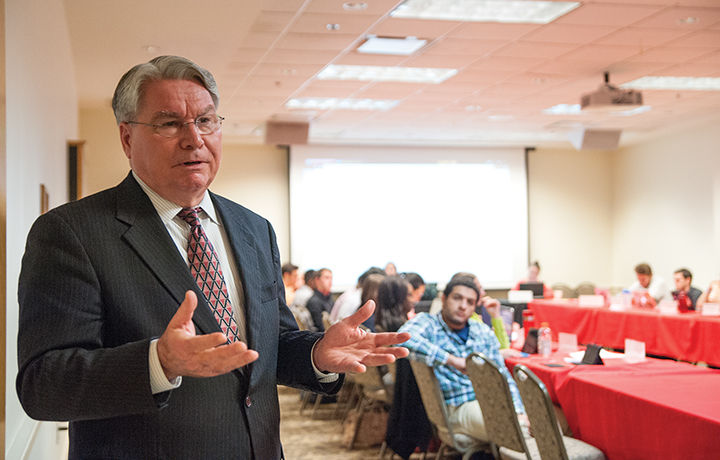To strengthen their relationship with University of Maryland students, University of Maryland Police are exploring various methods of community outreach, including the possible creation of a student police academy, University Police Chief David Mitchell said.
Since the deaths of Michael Brown and Freddie Gray, national news coverage has highlighted instances of police misconduct, amplifying the need for a positive partnership between the university community and University Police, Mitchell said. With this in mind, he said he wants to cultivate an environment in which students feel at ease around police officers.
“Cops are doing bad things — not all of us, some of us — but we’re all getting painted with the same brush,” Mitchell said. “How can we change that attitude to where people respect police?”
The academy has been discussed at an exploratory level within the department for several months, and students would be taught by the same staff that trains University Police officers, said Mitchell, who came up with the idea for the program. Students could participate in weapons training using props equipped with CO2 cartridges, and even take part in a simulated traffic stop while behind the wheel of a University Police vehicle, Mitchell said.
“[The academy would get students] to see more of the quality of police officer we have, learn more about policing and ask questions, which we love,” Mitchell said.
A police academy specially designed for this university’s students could be a way to earn their trust while also showing them firsthand how the department works to protect the campus, he added.
“We need to have greater interaction with our campus community, specifically with our student body, in a non-enforcement role,” Mitchell said. “We need to get down into the roots of the organization.”
Sophomore English major Ashling O’Connell said she hasn’t had much interaction with University Police, but thinks an academy for students, among other outreach initiatives, would be a fun way for them to connect.
“[The academy] is a good way to do it,” O’Connell said. “People would be more comfortable reaching out to [police officers] they know and are surrounded by more frequently.”
There is no definitive timeline for the academy’s creation or further details at this time, but Mitchell plans to work closely with this university’s Student Government Association to further develop the idea, he said.
And University Police’s outreach efforts do not stop there.
For the first time, Mitchell will address incoming freshmen during summer orientation, he said. He plans to inform them about potentially life-saving resources such as the Rave Guardian safety app, which links the police department and student body through a virtual platform.
Some University Police officers have also requested to patrol in either a motorcycle or bicycle instead of a police car, which would remove what Mitchell views as an obstacle that prevents direct interaction with students, he said. About half a dozen officers are currently trained to patrol on either a bicycle or motorcycle, and at least three more officers will be certified this summer, Mitchell said.
“The car makes us more efficient and more effective, but it doesn’t bring us closer to our community — it almost acts as a barrier,” he said.
Police spokeswoman Sgt. Rosanne Hoaas received her certification to patrol on a motorcycle four years ago, and does so at every opportunity, she said.
“The biggest difference I experience out on a [motorcycle] as opposed to driving around in a car is that there’s no longer a barrier — you’re out there and exposed,” Hoaas said. “If I could do my normal duties and go out on a motorcycle all the time, I’d be so happy.”
Because there is no way to instantly repair community-police relations, Mitchell is instructing his staff to stay patient and diligent in their efforts, and to treat every interaction — even traffic stops — as a chance to leave a good impression on the university community.
“Be kind, friendly and smile — [a traffic stop] might be the one contact that a student has or ever has with UMPD,” Mitchell said. “If that was your son or daughter, what would you want them to walk away with?”



